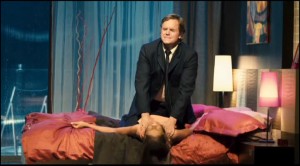Chip Crane, University of Pittsburgh
In “Cooperation,” the fourth section of Sergei Loban’s Chapiteau Show, Roma Kuz’menko is a Viktor Tsoi impersonator being used by Serezha, a promoter obsessed with simulacra, in an attempt to replace the original Tsoi with an “ersatz star.” The game played with the relationship between image and reality by the film, which seems at the same time to value and denigrate the copy when the original is no longer available provides a useful hermeneutic through which to understand the following problem: the distance between the viable cinematic middle class that appears on screen, and the less luxurious conditions of the real “rising Russian middle class.” Perhaps one, or both, is an “ersatz middle class” a degraded copy being performed by impersonators of an idealized original.

There is a precedent for this kind of widespread performance of class. As Sheila Fitzpatrick argues in Tear Off the Masks, the chaos of the Civil War destroyed the material basis of the proletariat, forcing the Bolsheviks “to invent the classes that their Marxist theoretical commitments told them must exist” by ascribing class identities to people based on factors other than their relationship to the means of production (29). In order to be ascribed to the “class” that legitimated Bolshevik power, people began to “impersonate” proletarians, seeking to be identified as a member of that class by behaving as a member of it should.
Lacking the material basis for an appropriately presentable middle class, Russian filmmakers have engaged in a similar process of invention, filling their screen with characters who behave as middle class characters should, performing impersonations of ideal models drawn from outside of Russia. Piling performance on performance, impersonation on impersonation, the primary role of the cinematic middle class seems to be to embody the inauthenticity that Western culture has long pinpointed as a central characteristic of their middle classes. Thus in Roman Prygunov’s Dukhless—itself an imitation of a French original, Jan Kounen’s 99 Francs (2007)—Max performs the role of a ruthless corporate schemer. He is allowed to truly become himself only with the loss of his position and wealth at the conclusion of the film (a near-death experience in the back of a garbage truck helps as well). Middle class Marina, the heroine of Angelina Nikonova’s Twilight Portrait, is so entranced by the simple authenticity of Andrei, a suburban policeman, that she abandons the shallowness of her own life. The fact that, before meeting Andrei, she was merely performing the role of wife, mistress, and social worker is made clear to her when he along with two other policemen rape her, causing reality to brutally intrude on her impersonation of a happy woman.

Perhaps the place of inauthenticity, impersonation, and performance at the heart of the Russian cinematic middle class is most clearly visible in Dmitirii Fiks’s White Moor, or Intimate Stories about My Neighbors. The film’s three male protagonists lead private lives revolving around deception. Andrei is unfaithful to his wife and Lenia is a closeted homosexual. While Misha is not as overtly deceptive as the others, his daughter diagnoses in him an existential inauthenticity, that prevents him have having real relationships either. This is related to Misha’s choice of profession—he is an actor who is shown throughout the film playing the lead role in Othello, a Western role-model for tales romantic intrigue and deception among a professional class. As in Dukhless and Twilight Portrait, Misha’s performance is interrupted by reality as he is stabbed by his wife after attempting to strangle her in a fit of (authentic) rage before turning to his daughter and asking, “am I real now?”
November 2013
Works Cited:
Fitzpatrick, Sheila. Tear Off the Masks: Identity and Imposture in Twentieth-Century Russia. Princeton: Princeton UP, 2005.
